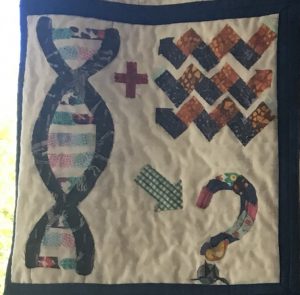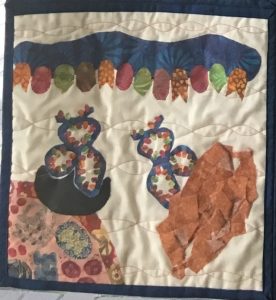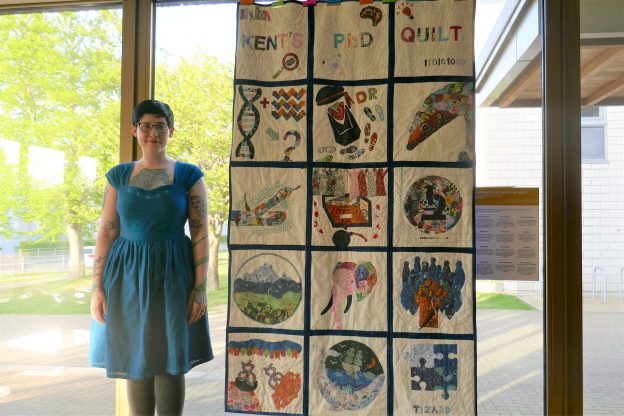Three SPS postgrads have taken part in an exciting project bringing art and science together, commissioned by PhD Candidate from the School of Anthropology and Conservation, Laura Thomas-Walters.
In a first of its kind, Kent’s PhD quilt project saw a number of Postgrad students, as well as staff from the Grad School, come together to participate in a new form of public engagement. Each individual quilt block was created by a different PhD student – enabling them to find a new way of communicating their research.
“I thought a visual and tactile representation of the breadth of research undertaken at Kent would be a unique form of public engagement.”
Laura Thomas-Walters, PhD candidate and project lead
Bringing Science and Art together
Not only is the PhD quilt a wonderful and creative idea, but it also enabled postgrads to relax, learn a new skill in fabric applique and embrace their artistic flair. Laura challenged each postgrad to consider the core concepts of their research, and think of how they wanted to showcase this through one image.
Each postgrad student was guided to learn the skills of fabric applique and create their overall piece on a 15″ square block. Each square piece was then sewn together into one quilt by Laura, and in collaboration with the Canterbury Quilters Society, to create a beautiful collage of artwork.
SPS postgrads embrace their creative skills
We are delighted to share that we had three SPS postgrads that enjoyed working on the project. Each of their pieces is unique, creative and visually showcases their research brilliantly.
Katy Bruce – Chemistry Postgraduate
“Cosmetics are often overlooked as a form of forensic trace evidence. I want to see how reliably I can discriminate between cosmetic foundation samples, using Raman microspectroscopy.”

Emerald Taylor – Chemistry Postgraduate
“DNA is well known to self-assemble to form the iconic double helix structure; peptides also self-assemble into beta sheets and alpha helices which form the foundation of protein structure. We aim to combine these two moieties in the search for new materials with properties which are as yet unseen outside of nature.”

Alexandra Paul – Chemistry Postgraduate
“Synthetic Selection of Enhanced Therapeutic Apatmers. The project will develop a novel method for the discovery of modifications which increase aptamer binding efficacy. The known apatamer that will be modified binds to EGFR, which in cancer cells is the protein that causes cell growth and division.”

Do you have an achievement to share? We would love to hear from you!
Contact our SPS Marketing team at spsmarketing@kent.ac.uk

